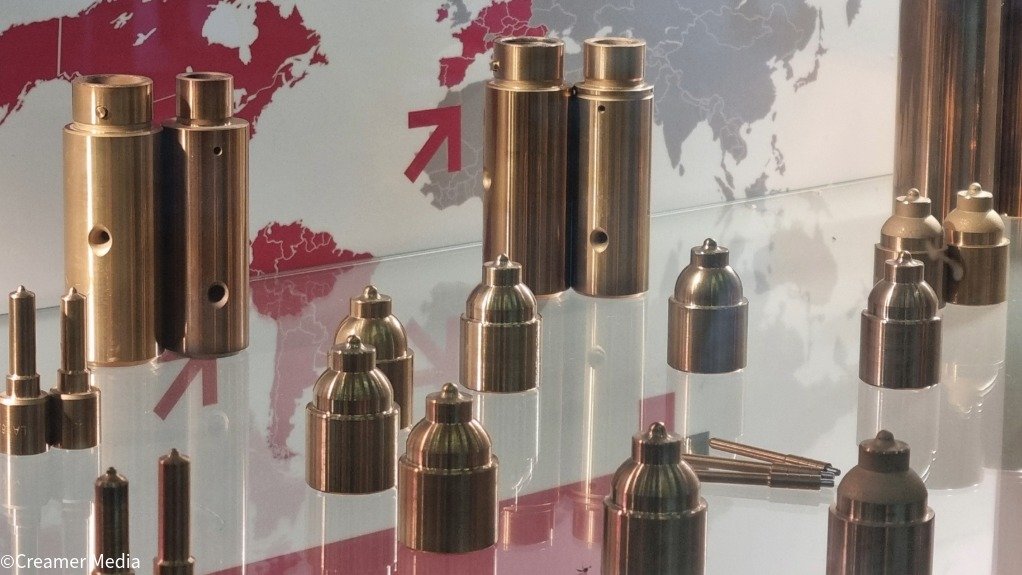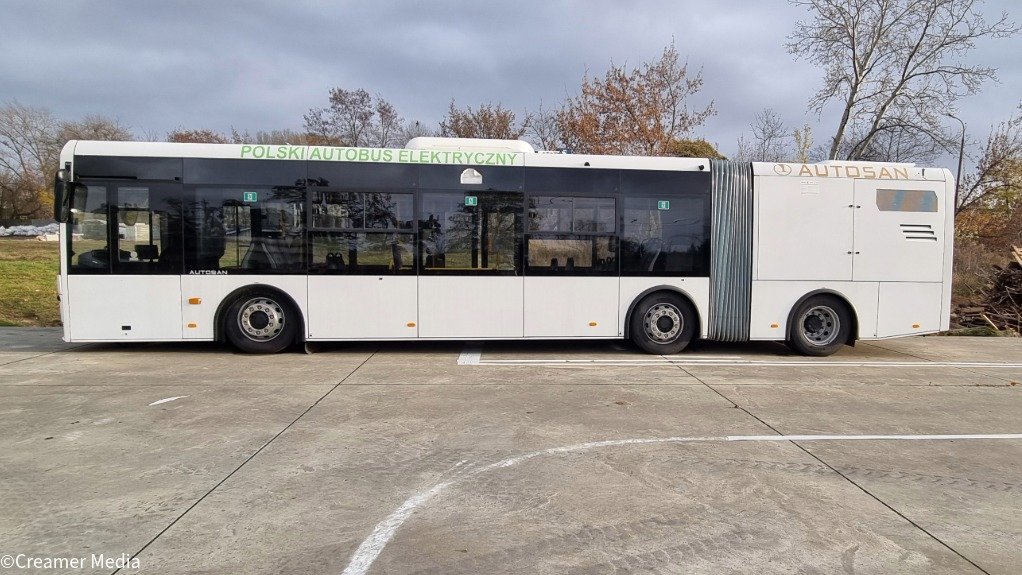Poland showcases manufacturing excellence as it seeks stronger African trade relations




ITS autonomous driving vehicle in Poland
Photo by Creamer Media's Marleny Arnoldi
Wuzetem's precision metal components manufactured in Poland
Photo by Creamer Media's Marleny Arnoldi
A modular electric bus developed by PIMOT research institute, in Poland
Photo by Creamer Media's Marleny Arnoldi
To strengthen the recognition of Polish automotive brands in the international market and to foster trade with the growing automotive sector in Africa, the Polish Investment and Trade Agency hosted a three-day media tour of various component manufacturers and research institutes in the country.
The Polish Ministry of Development and Technology aims to bolster the global presence of Polish small and medium-sized enterprises across 15 key sectors, including automotive, which have demonstrated manufacturing excellence to world-class standards.
Poland’s automotive industry employs about 200 000 people and produces about 570 000 vehicles, including 317 000 vans, 230 000 passenger cars and about 55 000 trucks, every year.
Poland accounts for 7% of the EU’s automotive production and generated $50-billion of export revenue in 2024.
The country mostly exports automotive components to Germany, France, Italy and the Czech Republic.
The original-equipment manufacturers present in the country include Volkswagen, Stellantis and Volvo. Poland also hosts producers of electric and hydrogen-powered buses such as Solaris. Another Polish manufacturer, Jelcz, manufacturers trucks, buses, trolleybuses and military vehicles.
The Polish automotive industry is investing heavily in research and development in automation and robotics, with the country being a leader in autonomous driving system and testing technologies.
The country is recognised for its engineering intelligence and fully automated production lines and, increasingly, its growing re-manufacturing market.
Industry body Polish Automotive Group MD Bartosz Mielecki confirms that the country is a hub for liquefied petroleum gas- (LPG- ) powered and other low-emission vehicle technologies.
He points out that the engineering capabilities of Polish automotive component manufacturers are scalable to suit different market demands, while the country’s research institutes offer research in technical safety, automation and electric mobility.
Wuzetem, a company showcased on the tour, specialises in manufacturing and supplying precision metal components for use in the automotive and industrial sectors. The company has 75 years of experience in the precision engineering industry, standing out for its top-quality workmanship, micron-level tolerances and full control over the entire production process – from design to machining and testing.
Wuzetem’s key strengths are its advanced machine park, its own research and development laboratory and its expertise in the machining of materials and coatings such as diamond-like carbon, which allows it to create products with exceptional durability and repeatability.
Its extensive portfolio and stable production in Poland increase security of supply and reduce dependence on Asian markets. Another strong advantage of the company is its technological partnership, which offers flexibility in prototype design, short production runs and engineering support.
Wuzetem is an existing exporter of advanced precision mechanical components to African markets, including nozzles for diesel engines.
In turn, ART-MOTOR is focused on manufacturing metal products and computer numerical control machining for customers across Poland and Europe. The company executes projects involving laser cutting, turning, milling, grinding, bending, stamping, welding and plastic injection moulding.
ART-MOTOR maintains a sophisticated machine park and an in-house quality control laboratory. Its products serve the automotive, industrial, food and pharmaceutical sectors.
The company’s offerings include radiator fans, sleeves and bushing, wiper motors, resistors, shock absorber cushions, engine cushions, cables and gear elements.
GAS SPECIALISTS
A company called AC is one of the leading European manufacturers of autogas, or LPG, and compressed natural gas (CNG) systems for vehicles, operating under the STAG brand.
The company offers a range of modern gas injection systems, controllers and diagnostic tools for fuel efficiency and reduced emissions.
AC manufactures more than 500 000 LPG and CNG systems every year, with operations in more than 60 countries. More than six-million vehicles globally have AC systems installed, while the company has undertaken more than 2.5-million conversions to LPG.
The company is actively exploring opportunities in the African market, with their solutions being valued for reliability, cost-effectiveness and adaptability to various engine types, including electric.
Notably, LPG or CNG conversions reduce emissions by between 25% and 30%, which may be a more viable option for African countries that want to advance cleaner mobility without the high costs associated with electric vehicles. Kenya, for example, has experienced significant growth in LPG-powered vehicles.
Another Polish manufacturer of high-quality LPG and CNG automotive systems, Alex, is known for its advanced in-house designs and production facilities. Its export reach extends across more than 40 countries globally, with the company now keen to expand its presence in African markets.
The company’s product portfolio includes complete systems for direct-injection petrol engines and indirect-injection petrol engines, as well as reducers, filters, gas valves, thermoplastic hoses and multivalves.
ADVANCED RESEARCH
The Łukasiewicz Research Network is one of the largest innovation ecosystems in Poland, bringing together various research institutions focused on applied science and industrial development.
Łukasiewicz supports Polish manufacturers in areas such as advanced materials, mobility technology, automation and green transformation. One of its subsidiary research institutions, PIMOT, undertakes dynamic vehicle testing, including electromagnetic compatibility testing, brake testing, fatigue strength testing of vehicle components and vibration resistance testing for batteries.
PIMOT also develops autonomous vehicles and modular electric buses, with the necessary infrastructure to test high-voltage battery installations that meet all regulatory requirements.
The institute offers advanced driver assistance systems development and creates algorithms for new and future data systems.
Numerical designs and analysis, as well as biofuel and renewable energy source testing are also part of the institute’s capabilities.
In turn, the Motor Transport Institute, or Instytut Transportu Samochodowego (ITS), in Poland has a Connected and Autonomous Vehicles Competence Centre, which provides expert support to the government in the safe and efficient implementation of vehicle autonomy technology in Poland.
This includes the evaluation of these technologies based on best international practices at various levels of standards, as well as the monitoring and initiation of national research in the field of road transport automation.
In particular, ITS conducts studies on driver behaviour and state monitoring using driving simulators, eye trackers and the Karolinska Sleepiness Scale; assesses and validates vehicle equipment in respect of human-machine interface; develops modern driver training methods; tests intelligence transport system components and conducts research in transport psychology.
Through the €10-million DARTS project, ITS develops a database of test scenarios for autonomous vehicles in Poland. ITS has recorded autonomous driving scenarios in different weather conditions and on roads with high accident rates. The database will ultimately comprise more than 800 different scenarios with information being made available on a non-profit basis to advance autonomous driving in Europe and globally.
“The aim is to record specific infrastructure elements that are potentially hard for automated systems to operate in and to add annotations to the data sets,” said ITS technical expert Anna Niedzicka.
The autonomous vehicles used for testing have seven visual cameras, six lidars, a thermal imaging camera and a positioning system.
ITS also conducts research on autonomous acceptance and how drivers react to autonomous vehicles in crisis situations.
Even in Europe autonomous driving faces challenges of road conditions and non-compliant drivers, but ITS is adamant that 90% of vehicle crashes are attributed to human error, which autonomous vehicles can solve for.
*Marleny Arnoldi was a guest of the Polish Investment and Trade Agency during a three-day tour of automotive component manufacturers and research institutes in Poland.
Article Enquiry
Email Article
Save Article
Feedback
To advertise email advertising@creamermedia.co.za or click here
Announcements
What's On
Subscribe to improve your user experience...
Option 1 (equivalent of R125 a month):
Receive a weekly copy of Creamer Media's Engineering News & Mining Weekly magazine
(print copy for those in South Africa and e-magazine for those outside of South Africa)
Receive daily email newsletters
Access to full search results
Access archive of magazine back copies
Access to Projects in Progress
Access to ONE Research Report of your choice in PDF format
Option 2 (equivalent of R375 a month):
All benefits from Option 1
PLUS
Access to Creamer Media's Research Channel Africa for ALL Research Reports, in PDF format, on various industrial and mining sectors
including Electricity; Water; Energy Transition; Hydrogen; Roads, Rail and Ports; Coal; Gold; Platinum; Battery Metals; etc.
Already a subscriber?
Forgotten your password?
Receive weekly copy of Creamer Media's Engineering News & Mining Weekly magazine (print copy for those in South Africa and e-magazine for those outside of South Africa)
➕
Recieve daily email newsletters
➕
Access to full search results
➕
Access archive of magazine back copies
➕
Access to Projects in Progress
➕
Access to ONE Research Report of your choice in PDF format
RESEARCH CHANNEL AFRICA
R4500 (equivalent of R375 a month)
SUBSCRIBEAll benefits from Option 1
➕
Access to Creamer Media's Research Channel Africa for ALL Research Reports on various industrial and mining sectors, in PDF format, including on:
Electricity
➕
Water
➕
Energy Transition
➕
Hydrogen
➕
Roads, Rail and Ports
➕
Coal
➕
Gold
➕
Platinum
➕
Battery Metals
➕
etc.
Receive all benefits from Option 1 or Option 2 delivered to numerous people at your company
➕
Multiple User names and Passwords for simultaneous log-ins
➕
Intranet integration access to all in your organisation





















